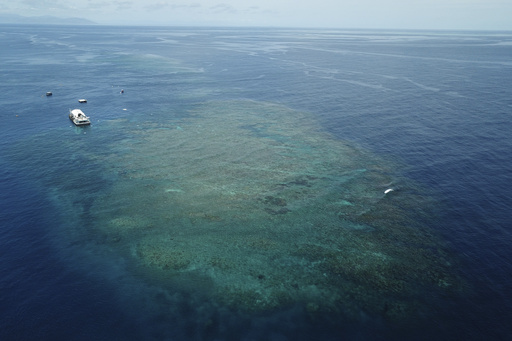Ocean temperatures in the Great Barrier Reef have reached their highest levels in 400 years over the past decade, researchers revealed. They warned that without halting planetary warming, the reef may not survive. The Great Barrier Reef, renowned for being the world’s largest coral reef ecosystem, has faced mass coral bleaching events between 2016 and 2024. During these events, high water temperatures cause coral to expel algae, which leads to a loss of color and potential death. Aerial surveys conducted earlier this year indicated bleaching in shallow water areas covering two-thirds of the reef, as reported by the Great Barrier Reef Marine Park Authority.
A recent study published in the journal Nature by researchers from Melbourne University and other Australian universities analyzed ocean temperatures by utilizing coral skeleton samples. They compared historical sea surface temperatures from 1618 to 1995 with data from 1900 to 2024. The study observed stable temperatures before 1900, with a consistent warming trend from 1960 to 2024. The years of coral bleaching in the past decade, particularly 2016, 2017, 2020, 2022, and 2024, experienced significantly elevated temperatures in January and March compared to any period dating back to 1618. These findings attributed the rise in temperatures post-1900 to human-induced climate change.
Lead author of the study, Benjamin Henley, warned that the Great Barrier Reef is in peril and emphasized the urgent need for a diversion from the current trajectory to avoid witnessing the demise of this natural wonder. The impact of climate change on coral reefs extends worldwide, affecting seafood production and tourism. The study’s authors cautioned that even if global warming aligns with the goals of the Paris Agreement, a substantial percentage of coral reefs across the globe remain at risk, potentially diminishing coral species diversity.
Michael McPhaden, a senior climate scientist at the National Oceanic and Atmospheric Administration, highlighted that coral reefs have been evolving in response to bleaching events. However, the escalating temperatures anticipated under a warming climate pose a significant threat to coral survival. The ongoing changes in coral species composition due to heat stress signify mounting concerns about the future vitality of coral reefs.
The Great Barrier Reef not only holds economic value for the region but also acts as a natural barrier against severe tropical storms. The imminent replacement of less heat-tolerant coral species with more resilient varieties raises apprehensions about the drastic loss of species diversity and a reduction in the reef’s overall coverage. McPhaden described the Great Barrier Reef as an indicator of climate change, emphasizing the critical importance of addressing environmental challenges to safeguard the reef’s future.
